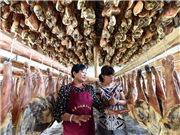

Banking: Mobile banking will help the poor radically transform their lives
The financial lives of the poor are very complicated. The Kenya Financial Diaries, a fascinating project documenting the financial lives of hundreds of Kenyans over the course of a year, tells countless stories of people who had to forgo medical care or take their children out of school for want of a few dollars.
The reason poor people face these agonizing choices is not just that they don’t have enough assets. They also don’t have access to a bank to help them use their assets effectively. If their savings are in the form of jewelry or livestock, for example, they can’t very well chip off tiny pieces to cover routine daily expenses.
Instead, the poor use financial services that are extremely inefficient. They save by hiding cash around the house or buying commodities that lose value over time. When they send money to friends and relatives to help them through tough times, they either take a day off and deliver the cash themselves or trust someone else to do it for them. If they need to borrow money for an emergency, they have to pay usurious interest rates to a moneylender. Not having access to a range of cheap and easy financial services makes it much more difficult to be poor.
But in the next 15 years, digital banking will give the poor more control over their assets and help them transform their lives.
The key to this will be mobile phones. Already, in the developing countries with the right regulatory framework, people are storing money digitally on their phones and using them to make purchases, as if they were debit cards. By 2030, 2 billion people who don’t have a bank account today will be storing money and making payments with their phones. And by then, mobile money providers will be offering the full range of financial services, from interest-bearing savings accounts to credit to insurance.
Traditional banks cannot afford to serve the poor because of their costs. That’s why 2.5 billion adults don’t currently have a bank account. In villages where people borrow or save in tiny denominations, building and maintaining a bank branch just doesn’t make sense. And when most people think about financial services specifically for the poor, they think of microcredit, such as small loans to businesswomen in poor countries. Indeed, small loans have helped millions of people, but loans are only one of the financial services the poor need, interest rates are relatively high, and these services have reached only a small fraction of the poorest.
The companies pioneering mobile banking find it profitable to serve the poor because the marginal cost of processing a digital transaction is near zero. And because so many people in developing countries have mobile phones—more than 70 percent of adults in many countries are subscribers now—the volume of transactions can be very high. By making small commissions on millions and millions of transactions, mobile money providers can make a profit serving poor customers, just as brick-and-mortar banks do serving the wealthy. Once these services get going, there will be competitive innovation in offerings like special savings or credit plans related to farming or education.
In Bangladesh, the fastest-growing financial services company is a mobile money provider called bKash. Less than four years after launching, it processes roughly 2 million transactions per day, with a total value of nearly $1 billion each month.
This vision of the future isn’t going to materialize by itself. There are barriers that people in the field are working hard to solve. Mobile phone access, for example, still isn’t equal; only 46 percent of Bangladeshi women own a phone, compared to 76 percent of Bangladeshi men, which means women lack access to services like bKash and the opportunities that the digital economy is bringing to Bangladeshi society.
There is a lot of work ahead to get regulators in developing countries to update their financial regulations. If the regulations limit digital banking, as is still the case in most countries, innovators can’t enter.
Another key factor to getting the use of digital money to critical mass is making sure there are enough locations where people can convert digital money into cash and cash into digital money. Without this as an enabling factor, the digital economy can’t get started. Making sure that enough retail stores in every community provide this service allows the digital economy to bootstrap into the mainstream.
One interesting feature of digital financial innovation is that some of it is happening in poor countries first. If we waited a few decades, banks in developed countries would invent digital banking tools, and they would trickle down eventually to developing countries. But because there is strong demand for banking among the poor, and because the poor can in fact be a profitable customer base, entrepreneurs in developing countries are doing exciting work—some of which will “trickle up” to developed countries over time.
 |  |
Day|Week

 Homemade cured hams in SW China
Homemade cured hams in SW China Breathtaking buildings of W. Sichuan Plateau
Breathtaking buildings of W. Sichuan Plateau Graduation photos of "legal beauties"
Graduation photos of "legal beauties" Top 10 most expensive restaurants in Beijing in 2015
Top 10 most expensive restaurants in Beijing in 2015 Special police force conducts multi-subject training in Urumqi
Special police force conducts multi-subject training in Urumqi 'Floating girls' in cheongsam
'Floating girls' in cheongsam Mysterious crater discovered in central China’s Hubei
Mysterious crater discovered in central China’s Hubei 630 monks walk for charity in Hangzhou
630 monks walk for charity in Hangzhou